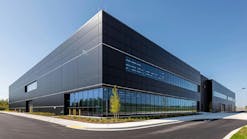Paul Olson doesn’t spend much time away from his successful seed dealership in northern Iowa, but when he does venture out, his multi-million-dollar inventory of seeds and equipment needs protection.
Olson Seed Service provides agricultural consulting, seeds and nutrients to local farmers. The company has a large investment in equipment and supplies that it has stored inside and outside its facility.
Olson’s property in Perry, Iowa, is isolated from the road, and after witnessing both major and minor incidents at his business and others in the area, Olson was convinced he needed a better set of eyes on his property. Since he runs the business with a very small crew, he does not have time to stare at monitors or troubleshoot quirky software and cameras.
While Olson’s operation may not measure up from a sheer size perspective to a sprawling corporate campus in the middle of some downtown location, the unique needs of the agricultural vertical market – coupled with an innovative cloud-based video solution from Vivotek, and Iowa-based integrator Tech Zone to bring it together for the customer – have earned this project the 2023 Security Vanguard Award Project of the Year from SecurityInfoWatch, Security Business magazine and Security Technology Executive (STE) magazine.
Local Problem Points to Larger Issues
For Olson, the consequences of theft for his business could be severe: He estimates typically having about $800,000 in equipment stored outside, along with nearly $6 million worth of patented seed and $300,000 in seed treatments stored inside the building. Some of the seed traits he has may no longer be available, so he can’t afford to lose them.
He says criminal activity has ramped up in rural areas of Iowa, with many of the targets being agricultural businesses. “There’s just a lot more eyes out here,” Olson says. “People run the gravel roads, kind of eyeballing open doors, seeing what you have. It’s not like the old days where you just put a lock on it and think that will keep them out.”
Tech Zone owner Robert Smith says talk among farmers centers on a noticeable increase in theft incidents, as well as a shift to new potential targets on farming operations.
“It used to be the fuel barrels they were worried about, but now it is a wagonload of seed,” Smith explains.
Olson confirms: “We have had some tampering issues with equipment that we had parked outside in the spring,” he says.
A Growing Problem: From Theft to Espionage and Hacking
Olson’s primary concern is grand theft; in fact, theft has always been a problem in rural America – whether livestock, fertilizer, equipment or crops. Recent statistics show that theft in rural Iowa alone has risen 60% over the past five years. Adding to the risk, most people likely think of big tech companies when it comes to foreign corporate espionage; however, agriculture is also on the front lines.
Case in point: The agricultural world was shocked in 2012 when a farmer from Dysart, Iowa – located just two hours from Olson Seed – spotted a man in business attire on his farm digging up hybrid seeds that were ultimately sent back to China. The company reported the incident to the FBI, which uncovered a large seed theft and smuggling ring, and the man digging in that field, Mo Hai Long, was later arrested by the FBI for stealing U.S. agriculture trade secrets and sentenced to 36 months in prison for the theft of inbred corn seeds with the aim of shipping them to a Chinese company.
One of the U.S. companies victimized by the theft estimated the crime would result in the loss of five to eight years of research and at least $30 million.
In August of this year, multiple Iowa farmers met in Dysart with the U.S. House Select Committee on Strategic Competition in a roundtable discussion focused on concerns about China and other foreign nations stealing agricultural technology and intellectual property from farmers.
Ranking Member Rep. Raja Krishnamoorthi (D-IL) shared another case of seed technology being targeted by the CCP. Haitao Xiang, a Chinese national who worked for Monsanto for nine years, bought a one-way ticket to China in 2017, placed a proprietary piece of software on an SD card, put it in his pocket and made his way to O’Hare International Airport, Krishnamoorthi said.
“What he didn’t know is that employees at his company were suspicious of his activities. They monitored his email traffic and alerted the FBI to what was going on,” he recalled. “So when he arrived at O’Hare and he went through the usual checks, an FBI agent was there waiting for him, they discovered the SD card in his belongings, and then they were able to prosecute the intellectual property theft.”
Krishnamoorthi adds: “But think about all the things that had to happen for that prosecution to actually unfold. And think about all the IP theft that is probably happening without us knowing. We can’t have a situation where we are constantly developing secrets and research and doing the hard work of innovating, and then all of a sudden having that getting stolen from us.”
Xiang pleaded guilty in 2022 to conspiring to commit economic espionage and was sentenced to 29 months in prison followed by three years of supervised release and a $150,000 fine.
“Our farms are more than just places to grow food – they are research laboratories…and they are strategic national resources,” Chair Rep. Mike Gallagher (R-WI) notes. “We have a duty to protect all our technology, whether it is in Silicon Valley or in a cornfield in Iowa.”
Cybersecurity has also emerged as a growing concern as farms consolidate and become larger and more automated, making themselves a more lucrative target.
A May 2021 ransomware hack of meat processing company JBS USA resulted in the payment of an $11 million Bitcoin ransom to restore operations. The White House later announced that the attack was likely conducted by a Russian organization. It was by no means an isolated incident; in fact, examples abound from every area of the agricultural vertical. Bad actors have targeted the dairy industry multiple times, including processing plants in October 2021 and March 2022. Produce powerhouse Dole disclosed in July a ransomware attack that temporarily closed several of the company’s North American production plants and cost them more than $10 million. The list goes on.
In response, President Biden has directed the USDA, Department of Homeland Security (DHS), and Department of Health and Human Services (HHS) to coordinate, accelerate, and expand research and development of cybersecurity capabilities for the food and agriculture sector.
At the local level, many agricultural areas are fighting back. Last month, Tulare County, Calif., unveiled the California Rural Crime Prevention Task Force, where law enforcement officers will take a 40-hour course on agricultural theft. The Task Force will also educate the public concerning the extent and seriousness of rural crime, and to focus its efforts on the prevention of crime in rural regions.
The Texas and Southwestern Cattle Raisers Association (TSCRA) special rangers investigate approximately 1,000 agricultural crime cases and recover an average of $5 million in stolen cattle and assets for ranchers annually. The rangers are stationed along the Texas/Oklahoma border and are commissioned to investigate agricultural crime in both states.
The Solution for Olson Seed
Whether the solution was intended for large equipment and seed protection or foreign espionage, the solution Tech Zone crafted for Olson Seed was designed primarily to ease the security monitoring burden on owner Paul Olson.
TechZone, which employs 15 people, works closely with schools and businesses in town but about 40% of its business comes from the agriculture vertical.
After the initial site visit, Smith’s staff used the System Surveyor site survey software to design the system. Using the software’s drag-and-drop functionality with the site’s floor plans, they came up with a design to cover Olson Seed Service’s doors, outside parking, and equipment yard with five Vivotek Vortex cameras, including three remote focus, zoom-lens dome cameras and two fixed-lens outdoor dome cameras.
With the system being cloud-based, Tech Zone simply put in a network switch in two areas of Olson’s building and tied them together. The system was cabled to allow for Power over Ethernet.
The VSaaS deployment integrates deep-learning-based network cameras with cloud management software, providing Olson with easy-to-use data analysis. The cloud architecture enabled the elimination of dedicated video management software. Instead, data can be stored and analyzed via edge computing directly within the camera and backed up in the cloud, which the manufacturer says reduces time, cost and bandwidth limitations. Olson receives push notifications in real-time on smart devices for deep-learning-based events.
Beyond the benefits to Olson Seed, the cloud-based system enables Tech Zone to more actively support Olson’s business. “If I get a phone call [asking for video footage] for the police, I don’t have to go down there and pull the video,” Smith explains.
“We really haven’t had any issues since we put the cameras in, so they act as a deterrent on their own,” Olson says. “It has been solid, and we really haven’t had any issues. The nice thing is if you do have a question, you’ve got somebody who is a phone call away that really knows the product. Having this system doesn’t hurt the neighbors, either, because if they have an issue we can go back and look and see what’s going on. When you are away somewhere, it is peace of mind.”
John Dobberstein is Managing Editor of SecurityInfoWatch.com.








